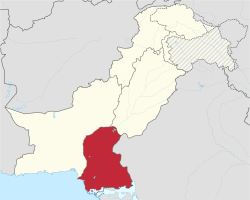| Pakistan Rangers Sindh سندھ رینجرز | |
|---|---|
 Insignia of the Sindh Rangers | |
| Common name | Sindh Rangers |
| Agency overview | |
| Formed | 1942 (as Sindh Rifles) 1995 (as Pakistan Rangers Sindh) |
| Employees | 24,630 personnel[1] |
| Jurisdictional structure | |
| Federal agency | Pakistan |
| Operations jurisdiction | Pakistan |
 | |
| Map of Sindh Rangers' jurisdiction (in red) within Pakistan | |
| Governing body | Ministry of Interior, Sindh Home Department |
| Constituting instrument |
|
| General nature | |
| Specialist jurisdictions |
|
| Operational structure | |
| Headquarters | Karachi, Sindh |
| Agency executive |
|
| Parent agency | Civil Armed Forces |
| Website | |
| pakistanrangerssindh | |
The Sindh Rangers (formally Pakistan Rangers Sindh) (Sindhi:سنڌ رينجرز) is a federal paramilitary force in Pakistan. It is one of nine Civil Armed Forces and is one of two Ranger forces with the other one being the Punjab Rangers, which operates in Punjab province. The corps operates administratively under the Interior Ministry of Pakistan, which consists of the Interior Secretary and Interior Minister and the Sindh Home Department which consists of the Home Secretary and Home Minister, but is usually commanded by officers on secondment from the Pakistan Army. Their primary purpose is to secure and defend about 912 km (567 mi) of the southern part of the border with neighbouring India. They are also often involved in major internal and external security operations with the regular Pakistani military and provide assistance to municipal and provincial police forces to maintain law and order against crime, terrorism and unrest.
As part of the paramilitary Civil Armed Forces, the Rangers can fall under the full operational control of the Pakistan Armed Forces when necessary. This is not exclusively limited to a wartime scenario, but whenever Article 245 of the Constitution of Pakistan is invoked to provide "military aid to civil power". An example of this occurring was in 2013, when Karachi, Pakistan's most populous city, had ranked as the sixth-most dangerous city worldwide due to intense violence by criminals, corrupt political agents and Islamist militants (whose presence came as a consequence of the Soviet–Afghan War and Pakistan's intake of millions of Afghan refugees in the 1980s). As the situation severely deteriorated and fell out of the control of local police, the Pakistan Rangers undertook a large-scale military operation and initiated an intense crackdown on criminals, the MQM political party, as well as Taliban-aligned militants. This operation took Karachi down from the world's sixth-most dangerous city to 93rd, and allowed the residents of Karachi to resume a normal lifestyle that had been disrupted due to the chaos.[3][4]
- ^ Cite error: The named reference
waseemwas invoked but never defined (see the help page). - ^ Pakistan Rangers Ordinance, 1959. punjablaws.gov.pk (Ordinance XIV). 1959. Archived from the original on 15 July 2019. Retrieved 16 October 2020.
- ^ Ali, Imtiaz (7 February 2020). "Karachi jumps 22 points since last year on global crime index". Dawn. Retrieved 22 April 2020.
- ^ ur-Rehman, Zia (7 November 2015). "Crime Down in Karachi, Paramilitary in Pakistan Shifts Focus". The New York Times. ISSN 0362-4331. Retrieved 22 April 2020.